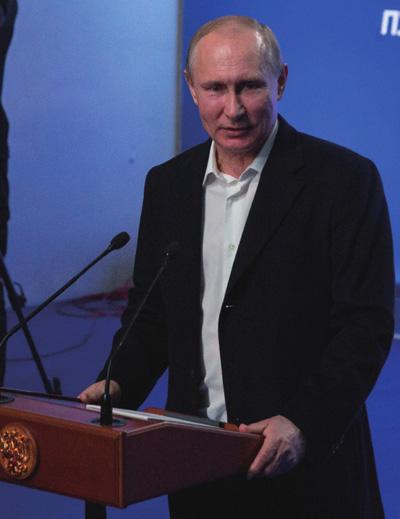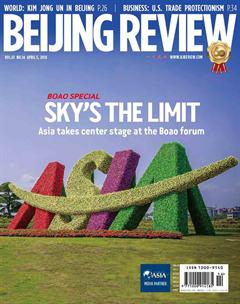The New Term
By Li Xing

Russian President Vladimir Putin secured his fourth term with a landslide victory in mid-March, winning around 76 percent of the vote. According to Russian law, Putin will hold the post for another six years until 2024, at which point he will have ruled the country for 20 years. During his fi rst three terms, Putin has committed to rejuvenating the once powerful country. He likely intends to make several more notable contributions to guarantee his legacy in the history of Russia and the world. In his fourth term, can Putin finally realize his dream of reviving Russia, and what internal and foreign policy will he adopt to crown his long career as the head of the Russian state?
Internal governance
During his fourth term, it is believed that Putin will continue to attach great importance to the development of the military in order to improve Russias defensive capabilities. Russia has long been faced with a harsh geopolitical and security environment. Since the end of the Cold War, the North Atlantic Treaty Organization (NATO) has continued to expand eastward, increasing its military presence and conducting military drills close to Russian borders. Together, NATO and the United StatesJapan alliance have besieged Russia from both east and west, and the economic sanctions imposed on Russia by Western countries following the crisis in Ukraine have further diminished Russias security situation.
As a country with a vast territory span- ning Asia and Europe, Russia has always felt insecure and relied heavily on military force. Putin has historically put a great deal of emphasis on the development of Russias military, which has helped him maintain high support rates during his previous terms. It is thus quite plausible that his fourth term will see the continuation of this policy.
Yet Russias military expenditure cannot rival that of the worlds sole superpower—the United States, and so instead Putins administration values the research and development of weapons characterized by relatively low-cost, high-technology, small size and maximum destructive capacity. Russia also looks set to continue weapons sales to the governments of other states, but in light of its limited economic power, it is unlikely that Russia would be willing or able to enter into an arms race.
Another top priority will be to boost the economy and improve peoples well-being, which is set to be the focus of his administration over the next six years. Russias economic development and the prosperity of the Russian people lag behind other developed nations due to a variety of factors, and are seen as the Achilles heel of Putins administration. Therefore, boosting the economy through structural improvements, developing an import-substitution industry and drawing on the countrys rich resources will be high on Putins agenda.
In his annual State of the Union address delivered in March, Putin said that Russia should aim to become one of the worlds top fi ve economies and increase its GDP per capita by 50 percent before the middle of the next decade. If this goal is to be reached, then Russia must adjust its economic structure, improve its competitiveness in technology and build a modern economic model based on innovation in order to maintain a high rate of growth.
It is believed that Putin is likely to focus on internal development to increase peoples welfare, including improving Russias economy, education, healthcare, social insurance and transportation. Any economic policy adjustment might concentrate on areas such as industry, finance, monetary policy and investment.
Diplomatic pursuits
In regards to diplomacy, Russia looks set to thaw ties with Western nations and could even make some concessions to this end although it is unlikely that this will involve any sacrifice of sovereignty. By resolving disputes through political and diplomatic means, Russia hopes to alleviate sanctions and avoid inciting an arms race.
Recent U.S. allegations of Russian interference in the 2016 presidential election have snowballed, and a new Cold War between Russia and the U.S. seems to have started. In recent weeks, over 20 countries have expelled Russian diplomats in response to the poisoning of an ex-spy in the UK, which according to the British Government, was almost certainly coordinated by Putins administration. Although current ties with Western nations are strained, the easing of tensions is not unlikely.
Free from the pressures of campaigning for reelection, Putin has no need to stoke Russian nationalism. Furthermore, U.S. President Donald Trumps voice in diplomacy might be increased, and the attitude of some Western nations could drift as economic sanctions continue to harm both sides without any sign of Russian submission. Putin will likely seize the opportunity presented by this parting of Western policies to ease tensions and attempt to lift the sanctions holding Russia back.
It is expected that Putin will also continue to promote the construction of the Eurasian Economic Union(EEU) and the Collective Security Treaty Organization (CSTO). The Commonwealth of Independent States (CIS), the support of which Russia relies upon for its status as a major global power, enjoys a special position in Russian foreign policy. Following the split within CIS, Russia has opted to conduct different policies with different countries rather than advancing the organization as a whole. Yet close ties with proRussian CIS members are vital to Russias status as a global power and form the core of the Eurasian economic partnership proposed by Russia. In order to secure Russias international status, Putin will continue to promote the EEU and CSTO.
Strengthening the China-Russia comprehensive strategic partnership of coordination and synergizing the EEU with the Belt and Road Initiative are believed to be the priorities of Putins China policy. Guided by the development of its eastern regions, Russia will expand cooperation with China in areas such as energy, culture and technology.
In March, the Presidents of China and Russia called each other to exchange congratulations on their respective reelections. During the call, Chinese President Xi Jinping remarked that the partnership between China and Russia has overcome hardship to reach a new historic high. China would like to continue to join hands with Russia to establish closer bilateral ties, deepen cooperation and design the future development of their relationship in the new era.
Putin agreed that the current China-Russia comprehensive strategic partnership is at the highest level of its history. He said Russia cherishes its friendship with China and aims to advance high-level exchanges and deepen their overall comprehensive partnership.
Under the leadership of both presidents, the EEU and the Belt and Road Initiative can be more closely aligned, which, with the help of the Shanghai Cooperation Organization and BRICS, could contribute to the rejuvenation of both countries and promote the building of a community with a shared future for China and Russia.
The next generation
Putins governance during the new term will be affected by many factors such as national strength, economic structure, national character, historical traditions and his own waning energy and capabilities. Russia has been long plagued by corruption and the shortcomings of its bureaucracy among other problems, and it is unlikely that any radical reform will occur in Putins next term.
According to the Russian constitution will be ineligible for reelection again until at least 2030, while Putin himself has made it clear that he does not plan to run in 2030. By all accounts, it looks likely that this term might be Putins last, and training potential successors will constitute an important task in the latter of these six years.

